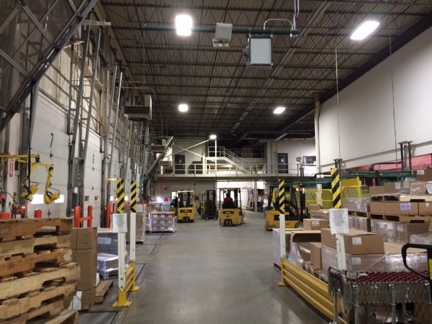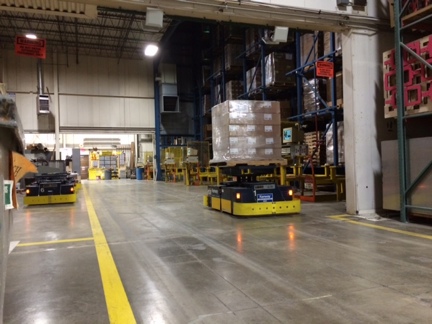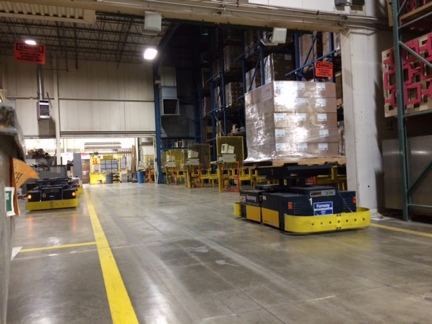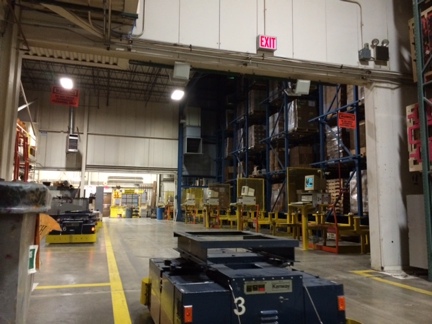Using RFID To Track Pallets in Real Time

Challenge
Accord Carton has always sought to invest in the latest technologies to ensure that it has the tools to fulfill its customers’ packaging needs. Equipped with some of the most state-of-the-art technology, the company’s facility in Alsip is a crane-served, high-density, high-storage warehouse that uses robots to move pallets to the conveyors to prepare for distribution.
Despite its existing automation technologies, Accord Carton realized it needed a more efficient method of data capture and entry. While the company was able to automatically confirm that a pallet met the dimensions of the racking system, its workers had to manually record the human-readable data off of a load tag and enter it into its warehouse database. Because this process was time-consuming and put Accord Carton at risk for errors, the company wanted to remove the manual data entry process and grab a key identifier that would allow it to seamlessly link databases. In addition, Accord Carton was unable to produce pallet-level reports and lacked valuable, real-time insight into its inventory. 
Solution
Although Accord Carton’s system was capable of producing barcodes, the nature of its product, the different pallet types, and their inability to utilize fixed tags led the company to determine that an RFID pallet tracking system would be the best-fitting solution. To help bring its plans for an RFID system to fruition, Accord Carton selected Barcoding, Inc., a leader in enterprise-wide data capture and RFID systems.
“Barcoding was very responsive to our needs and able to explain in depth everything we needed to know about implementing RFID for pallet tracking,” said Robert Mintari, IT manager, Accord Carton.
Barcoding’s solution incorporated RFID readers from its partner, Impinj, which were installed in three different zones in Accord Carton’s Alsip facility, and Barcoding's RFID RealView™ software. RFID RealView is a comprehensive, yet customizable RFID asset tracking software solution designed to track critical assets and inventory in real time. For the final piece of the solution, Barcoding integrated the RFID system with Accord Carton’s existing ERP and WMS databases, which use Open Database Connectivity (ODBC). In February 2012, Barcoding’s RFID solution went live at Accord Carton’s Alsip location.

Since implementing Barcoding’s real-time RFID asset tracking solution, Accord Carton has realized new efficiencies and enhanced its pallet-tracking capabilities. Now, as a tagged pallet moves off the production line and crosses into the receiving area, the RFID reader picks up and stores the pallet’s data, creating a link between Accord Carton’s two databases and automatically updating the finished goods inventory. There is no need for human intervention, thus eliminating the likelihood of errors from manual data entry, while saving time. Plus, with RFID RealView, the company can instantly locate pallets, monitor inventory levels, and access a detailed history of pallet movement.
“We’ve increased the accuracy of information and decreased the costs associated with obtaining the information pertaining to pallet movement,” said William Codo, owner of Accord Carton. “We are recording our most accurate inventory levels to date.”
Looking forward, Accord Carton would like to expand its RFID system, conducting further database integration, and even putting readers at its dock doors so that each individual pallet is automatically identified as it rolls onto the truck. Then, this data could be converted into a bill of lading.
For all future plans, Accord Carton will be able to draw from what it learned during this initial RFID project.
“When all the components of an RFID system are properly in place, the technology does exactly what is intended,” Mintari concluded. “However, one thing we learned throughout this process is the importance of securing buy-in from all the people involved in order to ensure a successful implementation.”
About Barcoding, Inc.
Barcoding, Inc. is a national systems integrator, specializing in the development, deployment, and management of supply chain and mobility systems based on automated data capture and wireless technology. More than 2,500 organizations depend on Barcoding, Inc. as their trusted advisor for barcoding and radio frequency identification (RFID) applications automating operations in: field service, food and beverage, healthcare, manufacturing and distribution, retail, transportation and logistics, and wholesale inventory. For more information, visit www.barcoding.com.
More warehouse articles:
The Need for Automated Tracking Systems in Warehouse Management - Why has barcode and RFID technology become so critical to warehouse management and inventory control? To stay competitive, warehouse managers are embracing RFID and barcodes to address issues like count accuracy and inventory movement. The head of a company specializing in transparency for warehouse managers provides an explanation for the growing trend.
What to Look for in a Vehicle-Mount Mobile Computer - Vehicle-mount warehouse management tools are showing up at facilities everywhere. What are some of the key capabilities and characteristics a high-functioning vehicle-mount mobile solution should have? Read about how two solutions are addressing some of the most critical warehouse management technology needs.
How Bar Code Labels Solved Issues With a Growing Inventory - A building foundations distribution center had a problem: the lack of an effective inventory management solution that could scale as its inventory expanded. It was experiencing picking issues that led to unfilled orders because parts and equipment were not easily located and processed. The company implemented a bar code label system which provided human-readable and scannable code. The handheld readers allow workers to scan bar codes up to 30 feet away.
Rugged RFID Performs in Extreme Conditions - Manually tracking parts, equipment and supplies that require audits or inspections in industries such as oil and gas, mining, and construction can lead to errors, down time or, worse, accidents. Holland 1916, Omni-ID and Ekahau are three rugged RFID providers who have answered the call for tags that can withstand extreme temperatures and damaging conditions while making inspections more efficient.
Cold Storage Barcode Labels Enhance Warehouse Management - For warehouse managers storing goods in cold containment, the need for a durable, temperature-resistent barcode label is sizable. Three barcode label suppliers provide labels that can withstand temperatures of up to -40°F. Another one provides cryogenic barcode labels that can handle temps as low as -80°F. These barcode label solutions can withstand moisture and maintain tackiness in the most extreme cold storage.

